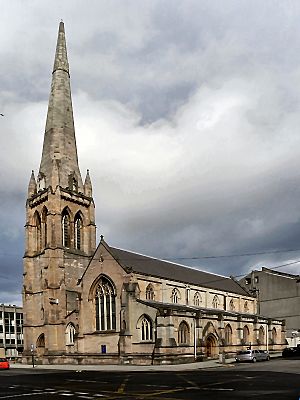St Andrew's West, Glasgow facts for kids
Quick facts for kids St Andrew's West |
|
|---|---|
| St Andrew's West Parish Church | |
 |
|
| Location | Glasgow |
| Country | Scotland |
| Denomination | Church of Scotland |
| Website | Church Website |
| History | |
| Former name(s) | Renfield St Stephen's |
| Status | Parish church |
| Architecture | |
| Functional status | Active |
| Architect(s) | John Thomas Emmett |
| Architectural type | Church |
| Style | Gothic Revival |
| Years built | 1849-1852 |
| Groundbreaking | 1849 |
| Completed | 1852 |
| Construction cost | £10,000 |
| Specifications | |
| Number of spires | 1 |
| Spire height | 67.1 m (220 ft 2 in) |
| Administration | |
| Parish | St Andrew's West |
| Presbytery | Glasgow |
St Andrew's West is a Church of Scotland parish church located in Glasgow, Scotland. It was once more commonly known as Renfield St Stephen's. This historic building was recognized as a Category B listed building in 1970, meaning it is an important building that needs to be protected.
Contents
History of the Church Building
The church was built between 1849 and 1852. It was designed by John Thomas Emmett in a style called English Gothic Revival. This style looks like the grand churches built in the Middle Ages. The building cost about £10,000 to construct. It was made from a type of stone called Kenmure sandstone.
Originally, it was built for a group that had separated from another church. By 1874, this group became smaller. An industrialist named James Baird bought the building. He then gave it to the Church of Scotland.
How the Congregations United
After the building joined the Church of Scotland, it became home to several different church groups, or "parishes," over the years. A parish is like a local community served by a church.
- First, it was known as Blythswood Parish Church.
- In 1920, it joined with St Matthew's parish, becoming St Matthew's Blythswood Parish Church.
- Later, in 1960, it united with St Stephen's Buccleuch, changing its name to St Stephen's Buccleuch Parish Church.
- In 1966, the church building was sold to the Renfield Street Trust. It became the new home for Renfield Parish Church. Their old church had closed and was taken down.
- In 1967, Cowcaddens parish also joined, and the church was simply called St Stephen's.
- The church was updated in 1969. A new church centre and a chapel were also built next to it.
- In 1974, Renfield parish and St Stephen's parish officially joined together. This created the Renfield St Stephen's church.
- Most recently, in 2019, Renfield St Stephen's and Anderston Kelvingrove united. They formed the new parish known as St Andrew's West.
Today, the church's congregation is made up of people from 15 original church groups that have come together over time.
The Hurricane of 1998
On December 26, 1998, a very strong hurricane hit Glasgow. The church's tall spire, which was being repaired at the time, collapsed. It fell onto the church building, causing a large hole and serious damage to the structure.
It cost a lot of money to fix the church, about £3,000,000. After all the repairs were done, the church was reopened and rededicated on September 28, 2001. The Moderator of the General Assembly of the Church of Scotland, John Miller, led the ceremony.
The Church Minister
The current minister of St Andrew's West is Dr. Kleber Machado. He leads the church services and guides the congregation.
The Organ and Organists
The church has a large pipe organ with three keyboards, called "manuals." This organ was first built in 1879 for another church. It was moved and rebuilt in St Andrew's West in 1968.
When the spire collapsed in 1998, the original organ console (the part with the keys and pedals) was destroyed. A new, movable console was built in 2001. This new console can be moved to different spots in the church. This is useful for both regular services and concerts.
The pipes of the organ are hidden in two rooms, one on each side of the front of the church. You can find more details about this organ on the National Pipe Organ Register.
The current organist for St Andrew's West is Gordon Cree. Many talented organists have played at this church over the years. One very well-known past organist was Avis McIntyre. She was born in 1932 and was a famous solo performer. She was also the only female Fellow of the Royal College of Organists (FRCO) living and working in Scotland for many years. She stopped playing in public after 2010.
See also
 | Laphonza Butler |
 | Daisy Bates |
 | Elizabeth Piper Ensley |

